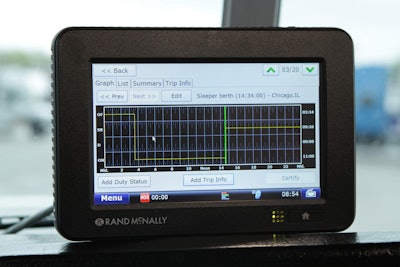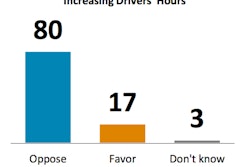
It comes down to the math: the traffic data and, of course, the vote count – and both favor the Collins amendment to suspend certain restart provisions in the year-old hours-of-service rule.
Let’s address the votes first.
Sen. Cory Booker is proposing a floor amendment of his own to block the Collins amendment.
The Senate Appropriations Committee passed the restart amendment by a bipartisan 21-9 tally. Not to oversimplify, but assume those 21 votes are reasonably solid – meaning they understood that the chances were good they’d take some heat from the anti-truck lobby.
Booker should have the support of the original nine votes on the Appropriations committee along with backing from several other powerful Senate Democrats.
But the 21 committee votes plus the partisan support of the remaining 30 Republican senators makes 51 votes in opposition, and I’m guessing it’ll be more likely for a few Democrats to support the amendment than it will be for Republicans to oppose it.
Is an obscure and complicated trucking regulation important enough for Senators to start swapping favors and votes for? The trucking industry might think so, and the victims’ groups – but inside the Beltway? Not so much – and not without a really solid case to fall back on.
And the solid case, in this instance, is in favor of the restart suspension.
ATA President and CEO Bill Graves distilled the numbers in a press call Monday, and the math is persuasive:
- Of the roughly 34,000 fatal traffic accidents in 2012, about 4,000 involved a commercial vehicle.
- A commercial vehicle was at fault in about 30 percent of those.
- Of that portion, Class 8 trucks were associated with 70 percent, which puts the number of big-truck fatalities at 840 or so.
- Fatigue is a factor in 7 to 15 percent of these accidents, bringing the total to between 75 and 100 deaths, out of that initial 34,000.
That’s 75 or 100 too many, absolutely – and responsible carriers continue to work to reduce safety risks because safety makes good business sense – but the sky is not falling.
And because of that math, the professional safety lobby must rely on generating an emotional response. (The recent emotional appeal by the top trucking regulator is a sure sign the agency’s argument is questionable on merit.)
It’s a two-pronged strategy: First, let the victims of a truck accident tell their stories – and the pain they express can be powerful. More importantly, paint the trucking industry as uncaring for opposing burdensome regulations.
Daphne Izer, the Founder of Parents Against Tired Truckers, has just such a story and she’s been tireless in her efforts to protect motorists.
In a press call Monday organized to oppose the restart amendment, she said the “might” of trucking lobby supports “sweatshops on wheels.”
“Safety has to be first and foremost before economic interests,” Izer said.
And many reasonable people might, on first thought, agree.
Except that federal rulemaking procedures, to protect against ill-advised and emotionally motivated regulations, requires a Regulatory Impact Analysis – basically, a regulation needs to solve a real problem and the rule must address that problem in a cost effective way.
The ATA has appealed to Congress out of frustration with the Federal Motor Carrier Safety Administration. Essentially, ATA contends that the evidence already demonstrates the changes in the driver restart regs do more harm than good, and the agency admits to “unintended consequences” but refuses to reconsider the matter.
The bottom line for FMCSA is that their math says the HOS rule changes will save 19 lives a year (out of 34,000), and the estimated benefits to health and safety reasonably outweigh the very real operational burden on trucking.
The problem is that FMCSA and rule supporters fudge the math. Sen. Booker, on the Monday call, said truck driver fatigue is the leading cause of truck accidents, and on the floor of the Senate recently he put that figure at 30 to 40 percent – which is hooey, according to ATA. (The trucking portion begins at the 5:52 mark in the video below.)
[youtube UpZzEZ6eZAI#t=5m52s nolink]
But Jackie Gillan, president of Advocates for Highway and Auto Safety, justifies the conjuring of a suitable multiplier: Fatigue-related fatalities are underreported because “dead people can’t talk,” she said Monday.
Not only an emotional appeal, but one logically impossible to evaluate.
Again, and not to discount the heartache and suffering of truck crash victims, but good regs don’t work that way. And I expect Congress to recognize that and support reconsideration of the restart. The rest, lively as it may be, is Capitol Hill theater.











